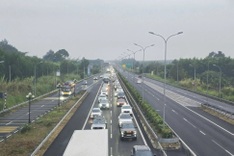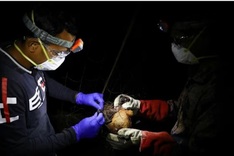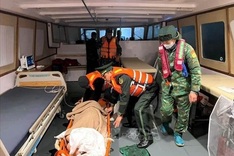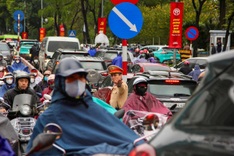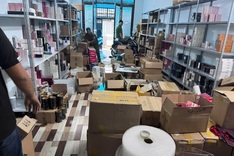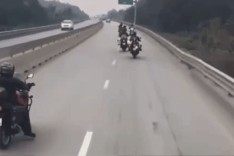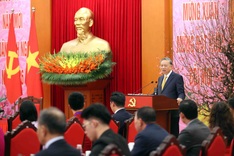On our first working day at Toan Thinh plastic recycling factory in Vinh Phu Ward in Binh Duong southern province’s Thuan An District, we saw a worker named Ba unloading a bag filled with discarded syringes from a truck that had just arrived with 15 tonnes of plastic waste. Walking past the factory owner, he asked her: “How many bags of syringes did we get in this shipment?”
 |
| Hundreds of untreated discarded syringes are collected to recycle them into plastic materials Photo: Tuoi Tre |
He then emptied hundreds of syringes from the bag into a yellow barrel near a set of milling machines. This is part of his daily routine.
At 10:00 am, Ms. Phuong, the factory’s owner, promptly ordered four new workers: “Help me classify the syringes and life-support water bottles and put them away in a corner of the warehouse.”
The factory doors had been opened briefly for a few minutes to receive the shipment and now securely locked to deter curious looks.
The four workers squatted on the ground, sorting out the syringes and water bottles based on their plastic type amid dozens of jute bags full of scraps piled up around them.
On the afternoon of August 16, we were ordered to carry the jute bags and put them near the milling machines that were used for grinding them into plastic grains.
We saw a lot of syringes lying scattered around the warehouse, many still had unwashed blood stains. Around 10 workers without gloves and face masks were busy mixing the syringes, water bottles, and drip-feed tubes with other plastic waste.
We stepped into a far corner of the warehouse and found hundreds of syringes of all kinds mixed with plastic bottles inside a jute bag. We also discovered the same contents inside 5 other bags.
“The good plastic quality of the syringes will give the plastic grains a better color. They would fetch a higher price than other types,” a worker told us.
A similar plastic recycling factory nearby but with a larger scale of operation is Thai Binh Plastic Company, owned by Mr. Duoc.
When we walked in, we found a worker skillfully using a large chopping knife to cut hundreds of needles off the barrels of the syringes.
He then classified the syringes into four types and splashed water on them to clean up blood and pus stains still attached to them.
 |
| A worker classifies discarded and untreadted syringes with his bare hand (Photo: Tuoi Tre) |
“I have to do that to wash away the blood stains. It is really scary to work with the syringes all day,” he said.
He then walked towards the plastic barrels in a corner of the factory and scooped up a handful of syringes: “It took me two entire days to cut and clean thousands of these syringes.”
A worker named Minh from Thuan An District’s Thuan Giao Ward told us that about half of the bags in each shipment contain syringes and the other half contain other types of plastic waste. The discarded syringes are mostly purchased from scrap shops at VND10,000 a kilogramme.
“When I first started work here, I just handled kid toys and bottles of water. But after only a few days the boss asked me to sort out the syringes that still had the stinking smell of blood. It really scares me,” said Phuong Thanh, a female worker also from Thuan Giao.
Some workers in the factory had had to be vaccinated after being accidentally pricked by the syringe needles.
On the morning of August 17, Ms. Phuong told us to empty dozens of bags of syringes into the milling machine.
A worker named Cuong poured all kinds of syringes, big and small, and other kinds of plastic into the machine funnel. In the sweltering heat, he took off his T-shirt drenched in sweat and ground on at his work.
Within seconds, numerous white plastic grains emerged and fell into the two water tanks under the machine. Three workers were waiting to collect the pieces of plastic floating in muddy water that gave off an unpleasant odor.
The grains would be washed twice before being bagged and drained of water. In just one hour, we finished grinding 10 jute bags of recycled plastic, including the medical waste. Each bag weighs around 40 kilogrammes.
The factories released its untreated water into a pond directly connected to the Saigon River.
During the same afternoon, the plastic grains were bagged and transported to Tan Phuoc Thinh Plastic Company in Pham Van Hai Commune in Binh Chanh District.
In the following afternoon, the owner of Tan Phuoc Thinh proudly showed his clients some grains in a jute bag and said: “This kind of plastic is used to make water bottles, drinking straws, plastic spoons and bowls. They are very popular on the market.”
Nguyen Khoa Ha Mai, a medical expert at Ho Chi Minh City’s Department of Health, said untreated medical waste is very harmful to the environment and human health if not properly handled or recycled.









